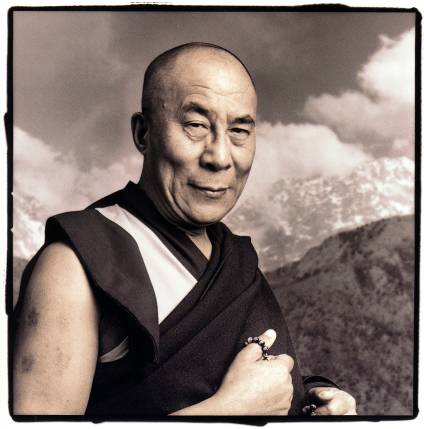Tag Archives: compassion

19 Life Lessons from the Dalai Lama
Life Hacks from the Dalai Lama
1. Take into account that great love and great achievements involve great risk.
2. When you lose, don’t lose the lesson.
3. Follow the three Rs:
Respect for self, Respect for others and, Responsibility for all your actions.
4. Remember that not getting what you want is sometimes a wonderful stroke of luck.
5. Learn the rules so you know how to break them properly.
6. Don’t let a little dispute injure a great friendship.
7. When you realise you’ve made a mistake, take immediate steps to correct it.
8. Spend some time alone every day.
9. Open your arms to change, but don’t let go of your values.
10. Remember that silence is sometimes the best answer.
11. Live a good, honourable life. Then when you get older and think back, you’ll be able to enjoy it a second time.
12. A loving atmosphere in your home is the foundation for your life.
13. In disagreements with loved ones, deal only with the current situation. Don’t bring up the past.
14. Share your knowledge. It’s a way to achieve immortality.
15. Be gentle with the earth.
16. Once a year, go someplace you’ve never been before.
17. Remember that the best relationship is one in which your love for each other exceeds your need for each other.
18. Judge your success by what you had to give up in order to get it.
19. Approach love and cooking with reckless abandon.
Image and quotes via Thrivedynamics
Albert Einstein on Interconnectedness
“A human being is part of a whole, called by us the Universe, a part limited in time and space. [We experience ourselves, our] thoughts and feelings, as something separated from the rest — a kind of optical delusion of [our] consciousness. This delusion is a kind of prison for us, restricting us to our personal desires and to affection for a few persons nearest us [excluding others, including animals]. Our task must be to free ourselves from this prison by widening our circles of compassion to embrace all living creatures and the whole of nature in its beauty.”
Rohr: Jesus and Buddha
In many ways, Jesus and Buddha were talking about a very similar process of human transformation.
Pain is the foundational teacher of transformation for both of them, which led to compassion in Buddhist language and love in Christian language (I accept the common definition that our suffering is the degree of resistance we have toward our pain). Buddha taught us how to change our mind about what causes our suffering; Jesus taught us to change our very attitude toward necessary suffering, and that we could make it into a redemptive experience for all concerned.
They both recognized that pain is the only thing strong enough to grab our attention and defeat the ego’s dominance. Our suffering, in my definition, is whenever we are not in control. It is our opposition to the moment, our inner resistance that says, “I don’t want it to be this way.” Since the ego is always trying to control reality, it is invariably suffering, irritated, or unhappy, because reality is never exactly what we want. Isn’t that true? So Buddha teaches us how to undercut the ego in a most radical way through mental attitude and discipline. Jesus teaches us how to undercut the imperial ego by always choosing love, dedication, and service. The final result is often the same, although Jesus’ teaching had more social implications, which most Christians roundly ignored.
Jesus’ suffering on the cross was a correct diagnosis and revelation of the human dilemma. It was an invitation to enter into solidarity with the pain of the world, and our own pain, instead of always resisting it, avoiding it, or denying it. Lady Julian of Norwich, my favorite Christian mystic, understood it so well, and she taught, in effect, that “There is only one suffering and we all share in it.” That is the way a higher consciousness eventually sees the so-called problem of evil. That is the way the Buddha saw it too. There is only one suffering, and for Christians Jesus personified a radical surrender to the cosmic mystery of human suffering—a non-resistance to reality until we learn its deepest lessons.
Adapted from Jesus and Buddha: Paths to Awakening
9/30 Quote: “When you practice gratefulness, there is a sense of respect toward others.” – Dalai Lama
7/4 Quote: Dalai Lama
“If you want others to be happy, practice compassion. If you want to be happy, practice compassion.”
~Dalai Lama
7/3 Quote: Jack Kornfield
“If your compassion does not include yourself, it is incomplete.”
~Jack Kornfield